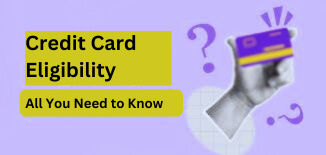Don't have an account?
Login to EaseMyDeal

2024-12-05
366
Applying for a credit card in India is a straightforward process, but it's important to meet the eligibility criteria set by banks and financial institutions. These requirements ensure that you can manage the credit extended to you responsibly. Whether you're applying for your first card or looking to upgrade to a premium one, understanding the essential eligibility factors is crucial for a successful application.
In this guide , we’ll break down the key credit card eligibility criteria, offer tips on how to increase your chances of approval, and provide answers to frequently asked questions. You can also apply credit card at EaseMyDeal.
Before you begin the application process, it’s important to know the basic eligibility criteria for credit cards. Here are the most common requirements:
The age requirement for a credit card varies slightly depending on the issuer and the type of card. Typically, most banks and financial institutions require applicants to be:
For certain types of cards like student credit cards, the age requirement may be lower, and parental consent may be required. Additionally, young professionals and entry-level workers can apply for entry-level or secured cards with less stringent age restrictions.
The income requirement for credit card eligibility can vary based on the type of credit card you're applying for, the card issuer, and your employment status. Generally, banks expect applicants to have a stable source of income to ensure that you can repay your credit card bills on time. The minimum annual income required ranges from 2.5 lakh to 6 lakh or more for standard and premium credit cards.
For first-time applicants or those with lower income levels, secured credit cards (where you deposit a fixed amount as collateral) can be a viable option.
Your credit score plays a significant role in the approval of your credit card application. The score is a reflection of your financial behavior and your ability to manage debt. Banks typically use this score to determine your risk as a borrower.
Banks also check your credit report to review your payment history, outstanding debts, and the number of credit inquiries. A good score increases your chances of receiving favorable terms, such as a higher credit limit and lower interest rates.
Both salaried and self-employed individuals can apply for a credit card, provided they meet the income and credit score criteria. Banks require proof of employment or business activity to ensure that you have a stable source of income.
If you're unemployed or have irregular income, applying for a secured credit card may be a good option, as these cards require a security deposit to back the credit extended to you.
Your residential status determines the type of credit card you can apply for. Some credit cards, especially those offering premium benefits, may have additional requirements based on your residency status.
To increase your chances of getting approved for a credit card, consider these tips:
You can also check online at EaseMyDeal to check your eligibility instantly and compare different credit card options based on your criteria.
What is the minimum age to apply for a credit card in India?
Most banks require you to be at least 21 years old, though some cards may have lower age limits, such as student credit cards.
Can I apply for a credit card with an annual income below 2.5 lakh?
Yes, you can apply for secured credit cards or entry-level cards, which have more lenient income requirements.
What is a good credit score for applying for a credit card?
A credit score of 700 or higher is generally considered good for applying for most credit cards.
Can self-employed individuals apply for a credit card?
Yes, self-employed individuals can apply for credit cards, but they must meet the income and documentation requirements.
How can I improve my credit score before applying?
Focus on reducing existing debt, making timely payments, and maintaining a low credit utilization ratio.
Can I apply for a credit card as a student?
Yes, some banks offer student credit cards with minimal eligibility criteria and no income proof required.
Do all credit cards have the same eligibility requirements?
No, eligibility varies depending on the type of card and the issuer. Premium cards may have stricter requirements than entry-level cards.
How can I check my eligibility for a credit card?
You can check eligibility on EaseMyDeal to check if you meet the requirements for different cards.
What is the debt-to-income ratio, and how does it affect credit card approval?
The debt-to-income ratio measures the percentage of your income spent on repaying debt. A low ratio increases your chances of approval.
Can I get a credit card if I have no credit history?
Yes, you can apply for secured credit cards or beginner-level cards designed for individuals with no credit history.
For more information visit our other Blogs:
1. Credit Card Application Online in India: Easy & Fast Process
2. Documents Required for Applying for a Credit Card
3. Instant Approval Credit Cards for Beginners: A Complete Guide

Write A Comment